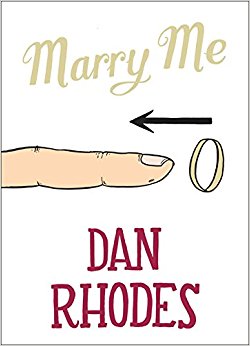TH: Marriage, in these stories, is a process that reveals glaring blind spots in relationships, to comic, tragic and sometimes bizarre effect. In this supposedly enlightened age where marriage is less of an obligation, why do we continue to put ourselves through it?
DR: I don’t think people ‘put themselves through it’, I think most people who get married do it for old fashioned romantic reasons – but that doesn’t make for interesting writing, so the book lingers a little more on the downside. Some marriages are a shambles and, for one reason or another, should never have happened, and that’s where the stories are. Who wants to read about contentment? For what it’s worth, I’m all in favour of marriage. Weddings, on the other hand . . .
Several characters here have a pedantic streak that puts their lover off, to put it mildly. In ‘Science’, flirtation becomes a chemistry lesson, and in ‘Mistake’, a grammar nerd corrects his wife’s declaration that she has made ‘the most biggest mistake’ of her life by marrying him, without registering what she means. Are we generally blind to our ‘most biggest’ mistakes?
These days people are inclined to broadcast their mistakes in real time on Facebook and Twitter, so even if they are blind to them they don’t hide them from the rest of the world. That’s one of the many reasons why I stay away from those kind of things. I’m not exactly innocent – I take the big mistakes of my life and publish thinly-veiled fictionalisations of them. I’m not a wholly open book, though – for a start I’ve never quite got around to telling my wife about the body under the patio.
The stories in this collection accumulate as variations on moments of rupture. Is what draws you to the form, as opposed to the novel?
I just write what comes into my head – sometimes long things, sometimes short. My work tends to be about people who struggle to understand what’s going on around them. I can’t think why that would be.
This collection is a lot of fun to read, was it fun to write?
I’m glad you found it fun to read. That, for me, is much more important than ticking literary boxes. Was it fun to write? Well, it took fifteen years, and it was very hard work, but I suppose there must have been some kind of satisfaction lurking in there, amid the grind.
Mistakes
On our honeymoon my wife lay beside me, writing a letter to her best friend. When she had finished, she asked me to check it over. I was glad to help, so I carefully read it through. Her handwriting is very neat, and her spelling and grammar are pretty good, but there were one or two minor glitches for me to point out. ‘See here?’ I said. ‘You’ve written “the most biggest mistake I have ever made” – but it should just be “the biggest mistake I have ever made”. And this bit, where you’ve put “it feels like a life sentance”, that should be “sentence”.’ I’d only caught one more error. ‘Where you’ve written “I dont know what I did to deserve this”, you need an apostrophe in “don’t”.’ I explained that it was a contraction, and that it was the job of the apostrophe to take the place of the missing letter. She looked very serious, nodding just a little as she took it all in.

‘Mistakes’, extracted from Marry Me, is reproduced with permission of Canongate.
You can also watch Tim Key, Stewart Lee, Aidan Moffat and Jenny Colgan reading more of Dan Rhodes’s stories here.
Photograph courtesy of Dan Rhodes







